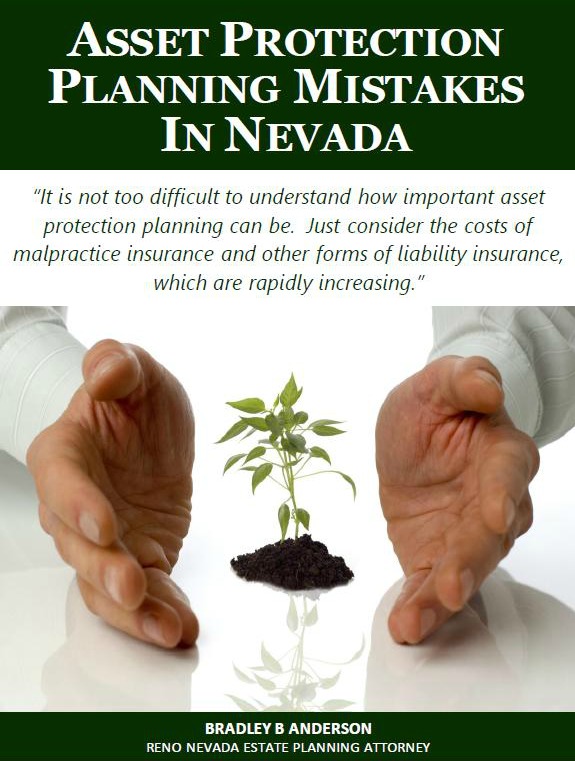 There are many different trusts that can be used to satisfy varying objectives. If you are concerned about the possibility of future creditors seeking to attach your assets, there is a particular type of trust that you should consider. The legal name of this trust structure is called a self-settled spendthrift trust. Among estate planning practitioners in Nevada, it is alternately referred to as a Nevada Asset Protection Trust.
There are many different trusts that can be used to satisfy varying objectives. If you are concerned about the possibility of future creditors seeking to attach your assets, there is a particular type of trust that you should consider. The legal name of this trust structure is called a self-settled spendthrift trust. Among estate planning practitioners in Nevada, it is alternately referred to as a Nevada Asset Protection Trust.
This type of trust can protect a number of different assets, including real estate, bank and brokerage accounts, personal belongings, business holdings, and other types of assets from future creditors. It may also be used as a prenuptial planning device to protect assets from spousal claims in the event of a future divorce. However, it should be noted that you cannot create a self-settled asset protection trust and convey assets into it to protect assets from creditors that already have a judgment against you.
Up until relatively recently, self-settled asset protection trusts were not legal in the vast majority of states. However, more and more states have laws on the books that allow for the creation of these trusts. Our office is in Reno, Nevada, and our state of Nevada is one of the states that does allow self-settled asset protection trusts. For your information, the other states that currently allow these trusts in one form or another are Alaska, Delaware, Hawaii, Mississippi, Missouri, New Hampshire, Ohio, Rhode Island, South Dakota, Tennessee, Utah, Virginia, West Virginia, and Wyoming.
We should point out the fact that you do not necessarily have to reside in the state where the self-settled spendthrift trust is going to be established. However, your will need to designate a trustee of the trust that resides in the state in which you are creating the trust. In addition, it is a good idea to relocate your assets to that state. This is relatively easy to do with some types of assets, like bank accounts and marketable securities. On the other hand, it is impossible to transfer real property to another state. For real property, it is recommended that you transfer the interest into a limited-liability company organized in the state in which you are creating the trust, and then transfer the membership interest in the limited-liability company to the trust. Then the trust will then own an interest in intangible personal property located in the state of the trust's creation.
When you decide to establish a self-settled or domestic asset protection trust, you are considered to be the grantor or settlor of the trust. You convey assets that you would like to protect from future creditors into the trust. It is important to understand the fact that this is an irrevocable trust, so the act of transferring property into the trust is permanent. You cannot change your mind later and take back personal possession of these assets.
The trust administrator is called the trustee, and generally speaking, the grantor of a self-settled asset protection trust would be prohibited from acting as the trustee. You would utilize an individual that you know or a professional fiduciary like an attorney, certified public accountant or the trust section of a bank or a trust company to handle the trust administration chores. The person or entity that is acting as the trustee must physically reside in the state where the trust is being created.
Once you convey assets into the domestic asset protection trust, you are not left completely out in the cold with regard to the utilization of assets in the trust. The trustee can distribute assets from the trust to you in accordance with the terms of the trust agreement. It would also be possible for the trust declaration to give the trustee the discretionary power to distribute assets to members of your family.
We should point out the fact that the trust will protect assets from future creditors, but sometimes there is a waiting period depending on the laws of the state in question. In Nevada, waiting period is two years, which is among the shortest of all the jurisdictions that recognize these trusts. So, by way of example, if you convey assets into a Nevada Asset Protection Trust today, and there is a judgment against you eighteen months from now, the assets may be fair game.
This is a relatively brief explanation of one of the many tools in the estate planning toolkit. Each case is different, and this is why personalized attention is very important. When you work with our firm, we will gain understanding of your needs, make recommendations, and help you put the ideal estate plan in place.
If you would like to schedule a consultation right now, we can be reached by phone at 775-823-9455. We are also holding a series of Webinars over the coming weeks, and you can learn a great deal about many different estate planning topics if you attend one of these information sessions.
They are free to attend, but we do ask that you register in advance to reserve your seat, because space is limited. You can check out the schedule and obtain registration information if you click the following link: Reno Estate Planning Webinars.
 As Reno asset protection attorneys, we emphasize the fact that relatively frequent estate plan revisions may be necessary. There are different events that occur throughout society as a whole that can render your existing estate plan in need of adjustments. At the top of this list would be changes to the tax code that impact the estate tax and/or the gift tax.
As Reno asset protection attorneys, we emphasize the fact that relatively frequent estate plan revisions may be necessary. There are different events that occur throughout society as a whole that can render your existing estate plan in need of adjustments. At the top of this list would be changes to the tax code that impact the estate tax and/or the gift tax.
One of the things that commonly takes place in the lives of individuals is a change in marital status. As we all know, many first marriages end in divorce, and most people who get divorced eventually remarry. If you decide that you would like to get remarried after having been divorced, you may want to consider entering into a prenuptial agreement.
Of course, everyone who remarries feels as though they have found the right person, or they would not be getting married. However, some 60 percent of second marriages do not endure, and over 70 percent of third marriages end in divorce. As you can see from the statistics, it is more likely than not that your second or third marriage will not last. Is it prudent to go forward without a prenuptial agreement given these figures?
Given these statistics, you should make sure that your children from previous marriages are provided for regardless of what takes place in the future. You can provide for your new spouse while ensuring the future well-being of your children if you plan ahead in an intelligent and informed manner. This is often done through the creation of a trust called a qualified terminable interest property trust (QTIP).
When you establish this type of trust, your spouse would be the first beneficiary, and you name your children as the secondary beneficiaries. You fund the trust with property that you eventually want to pass along to your children, but your spouse could potentially utilize the property while he or she is still living. For example, if you convey your home into the trust, your spouse could still live in it.
If there are income producing assets in the trust, you could empower the trustee to distribute this income to your spouse throughout the rest of his or her life. Your surviving spouse would be well taken care of, but the terms of the trust would be set in stone with regard to the eventual transfer of the assets to your children. After the passing of your spouse, your secondary beneficiaries would assume ownership of assets that remain in the qualified terminable interest property trust.
As we stated in the opening, changes in tax laws could necessitate the need for an estate plan update. On another level, if you experience extraordinary financial success over the years, you may suddenly be faced with estate tax exposure. If you originally created your estate plan when your assets did not exceed the amount of the estate tax exclusion, you would definitely need to discuss death tax efficiency strategies with an estate planning attorney.
For the rest of 2018, the estate tax exclusion stands at $11.2 million, and the maximum rate of the tax is 40 percent. This means that the first $11.2 million can pass to your heirs free of taxation, and anything that exceeds this amount is subject to the death tax and its rather high 40 percent rate.
There are a number of different strategies that can be implemented to ease the burden. One possibility is the creation of a qualified personal residence trust. The way that it works is you convey your home into the trust, and when you do this, it is no longer part of your estate. However, there is a gift tax that is unified with the estate tax, so when the beneficiary assumes ownership of the home after the expiration of the term, the gift tax would be applicable.
On the surface, it may seem as though there is no benefit from a tax perspective, but there is a catch. You can continue to live in the home as usual after you convey it into the qualified personal residence trust. This interim is called the retained income period.
For the purposes of this example, let’s say that you remain in the home for 10 years. No one would purchase a home at full market value if they could not occupy it for a decade. The Internal Revenue Service take this into account when the taxable value of the gift is being calculated. At the end of the day, the taxable value of the gift will be far less than the actual value of the home.
We are holding a number of free Webinars over the coming weeks, and you can learn a lot if you attend one of these information sessions. Click this link to see the schedule and follow the simple directions to reserve your seat. We encourage you to act now, because space is limited.
 Most clients understand that revocable living trusts are valuable components of an estate plan. But when asset protection is a primary goal of your estate plan, then revocable living trusts are not necessarily the way to go. The fact is, revocable trusts do not provide asset protection from legal claims or creditors. But, there are other options available that you should discuss with your Reno asset protection attorney.
Most clients understand that revocable living trusts are valuable components of an estate plan. But when asset protection is a primary goal of your estate plan, then revocable living trusts are not necessarily the way to go. The fact is, revocable trusts do not provide asset protection from legal claims or creditors. But, there are other options available that you should discuss with your Reno asset protection attorney.
When you create a revocable family trust, and in particular a living trust, you usually name yourself as the trustee so that you can retain control over your assets during your lifetime. That is the main reason revocable family trusts are so popular. The trust is revocable so you can make changes or revoke the trust at any point during your lifetime. Because you maintain the ability to use the trust property as you wish, to sell it or give it away without restriction, and to revoke the trust and transfer assets back into your individual name these assets essentially still belong to you. Therefore, those assets remain within reach of creditors. This is why you need the assistance of a Reno asset protection attorney if you wish to protect your estate from the reach of creditors.
One of the primary goals of revocable trusts is to avoid probate and the time and expense it requires. Unlike assets that are passed on through a last will and testament, assets in a trust are inherited without the need for probate. This can be a great benefit when you consider the cost of the probate process and the time it takes to complete the process. Probate can cost anywhere from approximately four to ten percent of the estate's full value and can take anywhere from 6 months to a year. The actual cost will vary depending on your family situation and the complexity of your estate.
Living trusts are a type of revocable trust that become effective during your lifetime, allowing you to retain control of your trust assets while you are alive. Upon your death, your successor trustee takes over control of the trust. The good thing about a revocable living trust is that your successor trustee can also take over if you become incapacitated. This type of provision can be extremely beneficial in case of illness or an emergency situation making it difficult for you to continue to manage your own affairs.
A trust is still the most common estate planning tool for asset protection, but it must be an irrevocable trust. “Irrevocable” means the terms of the trust cannot be changed later on. Because of this, the assets transferred to an irrevocable trust are considered to be removed from your estate, thereby putting them beyond the reach of creditors. Simply put, asset protection means analyzing your assets and arranging them in a way that provides the most protection possible. Done properly, you can protect all of your assets from the unexpected risk of loss, without fraud or tax evasion.
Although revocable trusts are not effective for accomplishing asset protection, there are other ways to protect your wealth through an appropriate asset protection plan. This plan must be created before claims and legal liabilities arise, though. If not, asset transactions may be seen as violations of the “fraudulent transfer” law, which could have serious consequences. Because most people cannot easily determine when a legal claim may arise, it is best to start your asset protection planning now. Once you have been served with a demand for payment or a lawsuit, it is likely too late to plan. Let a Reno asset protection attorney help you be prepared.
A common misconception most people have is that asset protection requires surreptitious transactions for the purpose of evading and deceiving. However, that is not true at all. Everyone has the right to structure their assets in a way that is financially beneficial. This can easily be done within the limits of the law. Actually, the only time fraud becomes an issue is when it is clear the intent was to hinder, delay or defraud creditors from collecting legal debts. With the help of an experienced Reno asset protection attorney, you can do it the right way.
One of the most challenging components of asset protection is determining who may be a potential creditor. The better you are at determining where potential claims may arise, the easier it will be to create an effective asset protection plan. The key is to be able to create a strategy for protection against particular claims that will limit your exposure to liability.
If you have questions regarding a revocable family trust, or any other estate planning issues, please contact Anderson, Dorn & Rader, Ltd. for a consultation, either online or by calling us at (775) 823-9455.
 It is relatively easy to understand how important asset protection planning for Nevada residents can be. Most people want to make sure their assets are protected, including real estate, investments, business interests, and even personal property. Just consider the costs of malpractice, business (E&O), and other forms of liability insurance, which are rapidly increasing. It is certainly important to be preemptive in protecting your assets from potential creditors, whether that is through an insurance policy, homestead, or other asset protection plan. What may be even more important is understanding the most common mistakes in asset protection that Nevada residents should avoid.
It is relatively easy to understand how important asset protection planning for Nevada residents can be. Most people want to make sure their assets are protected, including real estate, investments, business interests, and even personal property. Just consider the costs of malpractice, business (E&O), and other forms of liability insurance, which are rapidly increasing. It is certainly important to be preemptive in protecting your assets from potential creditors, whether that is through an insurance policy, homestead, or other asset protection plan. What may be even more important is understanding the most common mistakes in asset protection that Nevada residents should avoid.
One common mistake that many people make is assuming that there is something wrong with creating a plan to protect your assets. Many people feel like they are "hiding assets" or irresponsibly "sheltering" their estate from the reach of creditors. That simply is not true. We are all free to structure our assets in the most advantageous way available, as long as we do so properly and in accordance with the law. The only time that the issue of fraud is raised is when the purpose of an asset protection plan is solely to hinder, delay, or defraud creditors from collecting valid debts. The key is to create your asset protection plan before the creditors' claims arise.
Plan in advance! Another mistake that some individuals make is not taking action to protect their assets until after a problem has arisen. If you've already been sued (or if you know you're about to be sued), it's likely too late to effectively create a plan. The best and most effective asset protection planning is accomplished long before any creditor claims arise. The best time to start an asset protection plan is when you are solvent and not currently facing any threats from existing creditors. The purpose of asset protection planning is to protect from potential future creditors. The sooner you start planning, the more options will be available to you.
One aspect of asset protection planning that is difficult for most people is making a proper determination of who is likely to be a potential creditor. Those who are able to make this determination are better able to make an effective asset protection plan. It is easier to plan when you know exactly what you are planning for. In other words, if you can implement a strategy to protect against certain claims you can more easily limit your exposure to that liability. Some common ways to avoid liability, especially for business owners, include:
You cannot rely on an asset protection plan someone else used. Friends may be well-intentioned, but one size definitely does not fit all when it comes to asset protection planning. Not every protection strategy will work in every case. Any estate planning attorney will tell you – an asset protection plan needs to be developed on a case by case basis. Some people can effectively create an asset protection plan by taking advantage of legal protections under homestead, ERISA, business, and other federal and local laws; still others may need a more complex asset protection trust to deal with potential creditors. Individual needs must be carefully considered when choosing your planning options, so don't use a boilerplate plan and hope that you will be protected. Most likely, you will not.
Many clients have the same misconception, that any type of trust can provide asset protection. That is not the case. First, revocable living trusts do not provide protection for individuals who created the trust simply for that purpose. It is important to remember that, in most states, when the person who has funded the trust is a potential beneficiary, then the assets may not be protected from creditors. However, a properly drafted revocable living trust may be able to add asset protection for surviving spouses and/or other beneficiaries. An irrevocable trust can only protect property that is transferred to the trust as long as there is no evidence of a fraudulent conveyance, and a statutory period of time has passed before a creditor claim arises. Foreign offshore trust accounts have come under scrutiny in United States Courts, recently. Very special care must be given when implementing an asset protection plan that includes an offshore account.
A part of asset protection planning necessarily includes consideration of possible inheritances from relatives, a factor that is often overlooked. Those inheritances must be structured, as well, in order to provide maximum flexibility, as well as, protection against creditors and divorce. An estate plan is a way for you to prepare yourself and your family for what happens after you pass away. An appropriate estate plan can also give you an opportunity to plan for unexpected incapacity. Regardless of how few assets you may have, planning for your family's future is a necessity for everyone.
If you have questions regarding mistakes in asset protection, or any other asset protection planning needs, please contact Anderson, Dorn & Rader, Ltd., either online or by calling us at (775) 823-9455.
 Most clients understand that living trusts are valuable components of an estate plan. But when asset protection is a primary goal of your estate plan, revocable trusts are not necessarily the way to go. The fact is, revocable trusts do not provide asset protection from legal claims or creditors. If you have the ability to take assets out of a revocable trust as a trustee, then your creditors have the same ability to enforce a judgment against you. But, there are other options available that you should discuss with your estate planning attorney.
Most clients understand that living trusts are valuable components of an estate plan. But when asset protection is a primary goal of your estate plan, revocable trusts are not necessarily the way to go. The fact is, revocable trusts do not provide asset protection from legal claims or creditors. If you have the ability to take assets out of a revocable trust as a trustee, then your creditors have the same ability to enforce a judgment against you. But, there are other options available that you should discuss with your estate planning attorney.
When you create a revocable trust, and in particular living trust, you usually name yourself as the trustee so that you can retain control over your assets during your lifetime. That is the main reason revocable living trusts are so popular - the trust is revocable so you can make changes or revoke the trust at any point during your lifetime. This allows for flexibility to account for changes in your assets, financial status, and family. However, because you maintain the ability to use the trust property as you wish, to sell it or give it away without restriction, these assets essentially still belong to you. Therefore, those assets remain within reach of creditors.
Although revocable trusts are not effective for accomplishing asset protection, there are other ways to protect your wealth, through an appropriate asset protection plan. This plan must be created before claims and legal liabilities arise, though. If not, asset transactions may be seen as violations of the “fraudulent transfer” law, which could have serious consequences. Because most people cannot easily determine when a legal claim may arise, it is best to start your asset protection planning now. Once you have been served with a demand for payment or a lawsuit, it is likely too late to plan.
A trust is still the most common estate planning tool for asset protection, but it must be an irrevocable trust - where assets are transferred to the trust under management by an independent trustee. “Irrevocable” means the terms of the trust cannot be changed later on. Because of this, the assets transferred to an irrevocable trust are considered to be removed from your estate putting them beyond the reach of creditors. Simply put, asset protection means analyzing your assets and arranging them in a way that provides the most protection possible. Done properly, you can protect all of your assets from the unexpected risk of loss, without fraud or tax evasion. So long as a legal claim or liability doesn't arise for a statutory period of time, those assets can be kept out of the reach of creditors.
A common misconception most people have is that asset protection requires surreptitious transactions for the purpose of evading and deceiving. However, that is not true at all. Everyone has the right to structure their assets in a way that is financially beneficial. This can easily be done within the limits of the law. Actually, the only time fraud becomes an issue is when it is clear the intent was to hinder, delay, or defraud creditors from collecting legal debts.
One of the most challenging components of asset protection is determining who may be a potential creditor. The better you are at determining where potential claims may arise, the easier it will be to create an effective asset protection plan. The key is to be able to create a strategy for protection against particular claims that will limit your exposure to liability.
One of the primary goals of revocable trusts is to avoid probate and the time and expense it requires. Unlike assets that are passed on through a will, assets in a trust are inherited without the need for probate. This can be a great benefit when you consider the cost of the probate process and the time it takes to complete the process. Probate can cost between four and ten percent of the estate's full value and can take anywhere from 6 months to a year, or longer. The actual cost will vary depending on your family situation and the complexity of your estate.
Living trusts are a type of revocable trust that become effective during your lifetime, allowing you to retain control of your trust assets while you are alive. Upon your death, your successor trustee takes over control of the trust and will manage the assets as you've directed in your trust agreement. The good thing about a revocable living trust is that your successor trustee can also take over if you become incapacitated. This type of provisions can be extremely beneficial in case of illness or an emergency situation making it difficult for you to continue to manage your own affairs, and will avoid the laborious and intrusive process of petitioning for a judicial guardianship or conservatorship.
If you have questions regarding revocable trusts or any other estate planning issues, please contact Anderson, Dorn & Rader, Ltd. for a consultation, either online or by calling us at (775) 823-9455. Attend a free Webinar about revocable living trusts and their benefits!

One aspect of asset protection planning that is difficult for most people is making a proper determination of who is likely to be a potential creditor. Those who are able to make this determination, are better able to make an effective asset protection plan. It is easier to plan when you know exactly what you are planning for.
Topics covered in this report include:
Click here to read the whole article or download the PDF.
 Asset protection is very important to anyone who wants to protect their estate but proper protection can be tricky. Asset protection planning is basically the process of evaluating all of your assets and arranging, or rearranging, them so you can protect them against loss. However, if not done correctly, you may cross the line into tax evasion or creditor fraud. Fraudulent transfers are a major concern in the area of estate planning.
Asset protection is very important to anyone who wants to protect their estate but proper protection can be tricky. Asset protection planning is basically the process of evaluating all of your assets and arranging, or rearranging, them so you can protect them against loss. However, if not done correctly, you may cross the line into tax evasion or creditor fraud. Fraudulent transfers are a major concern in the area of estate planning.
A fraudulent transfer, also referred to as a fraudulent conveyance, is the process of moving your assets to avoid creditors or legal liability. Whenever you convey assets for the purpose of defrauding a legitimate creditor, you are guilty of making a fraudulent transfer. The only intent required is knowing that your assets are at risk, or could be used to satisfy some legitimate legal obligation, and you move those assets out of reach.
The key is, asset protection must be done when you are not at risk, meaning you are conveying your assets when your asset protection plan is created, not when you are in some legal situation that puts your assets at risk. The problem is, even if fraud or debt avoidance is not your intent, your asset transfers may still be viewed as fraudulent, depending on the situation. It is all about timing.
For an asset protection plan to be truly effective, it must be put in place long before a creditor’s claim has been made, or any sort of liability arises. Any transactions involving your assets, which occur after the claims have arisen, are likely to be considered fraudulent. Prior planning is also important because not many people really understand or recognize when a claim of liability arises. Once you receive a demand for payment on a debt, or been served with a lawsuit, it is too late to start planning.
It is a common misconception that the only consequence of late planning is the canceling of the fraudulent transaction. Instead, both the debtor and the person who aided in the fraudulent transfer can be held liable for attorney fees incurred by the creditor involved. The debtor may also lose any chance of discharging that particular debt in bankruptcy. Many states have fraudulent transfer laws which provide very stiff penalties for fraudulent transfers.
In Nevada, a conviction for "fraudulent conveyance" is considered a gross misdemeanor, the punishment for which is up to 364 days in jail and/or up to $2,000 in fines, as well as restitution. “Receiving” a fraudulent conveyance is a misdemeanor in Nevada, resulting in up to six months in jail and/or up to $1,000 in fines, and restitution.
If a creditor can prove that you have moved your assets to avoid liability, your assets may be seized, even after they have been transferred. All a creditor has to show is that you transferred your property, you received less than fair market value for that property, and the transfer left you unable to satisfy that creditor. All three of these things must be shown. An asset protection plan goes a long way toward preventing creditors from seizing your assets, and even more important keeping you out of jail.
If you have questions regarding fraudulent transfers, or any other asset protection planning needs, please contact Anderson, Dorn & Rader, Ltd., either online or by calling us at (775) 823-9455.
Asset protection is defined as the process of examining your assets and rearranging them in a way that protects them from loss. Learn more about Nevada Assets From Lawsuits in this presentation.
 Asset protection is simply the process of examining your assets and rearranging them in a way that protects them from loss. Depending on the extent and nature of your assets, your asset protection plan may be complicated. Regardless, as long as your asset protection plan is created and executed correctly, you will be prepared for the unpredictable situations that occur, which may put your estate at risk.
Asset protection is simply the process of examining your assets and rearranging them in a way that protects them from loss. Depending on the extent and nature of your assets, your asset protection plan may be complicated. Regardless, as long as your asset protection plan is created and executed correctly, you will be prepared for the unpredictable situations that occur, which may put your estate at risk.
Topics covered in this report include:
Click here to read the whole article or download the PDF.
 It is important for debtors to have strategies for protecting their valuable assets from potential creditors, just as it is important for creditors to have techniques for collecting debts. Furthermore, just as creditors are required to follow the laws and regulations that govern their debt collection practices, debtors must be careful that their asset protection strategies do not cross the line into fraudulent transfers.
It is important for debtors to have strategies for protecting their valuable assets from potential creditors, just as it is important for creditors to have techniques for collecting debts. Furthermore, just as creditors are required to follow the laws and regulations that govern their debt collection practices, debtors must be careful that their asset protection strategies do not cross the line into fraudulent transfers.
The major concern in deciding when to start asset protection planning is being sure to avoid the appearance of a “fraudulent transfer.” With the help of an experienced and knowledgeable asset protection planning attorney, you can avoid the pitfalls that can get you in trouble, while you start asset protection planning for you and your family.
Start planning prior to creditor’s claims
There are many techniques for accomplishing asset protection, but they are only effective before a creditor’s claim or some other financial liability arises. The transfer of assets after a claim has arisen may be considered fraudulent. The most common example of an illegal transaction is when a debtor tries to "sell" everything to a relative for very little, solely to keep the property out of the reach of creditors.
Late planning may have serious consequences
Many clients believe that the worst that can happen is a court will undo or reverse the fraudulent transfer, leaving the client no worse off than before. In reality, both the debtor and the one who received the property, can be held liable for any attorney’s fees incurred by the creditor in collecting the debt.
What is the best way to protect assets?
Asset protection first requires looking at the nature and value of your assets and then rearranging them in a way that will maximize their protection from loss. The purpose of asset protection is not to evade taxes or defraud creditors. Instead, it simply allows you to prepare for financial situations that could possibly occur, in order to help preserve your estate for the benefit of your family.
Possibly the most common estate planning tool for accomplishing this goal is a trust. When assets are transferred to a trust, they are effectively removed from your estate. As a result, those assets are not subject to estate taxes upon your death. There are different types of trusts, with their own benefits, which can be tailored to meet the different needs and goals of each client. Discuss all of your options with your estate planning attorney to determine what will be best for you and your family. Generally speaking, trusts do not protect personal assets. But, under some circumstances an irrevocable trust may provide protection of certain assets. If you also have business assets, those need to be protected by a business entity, such as a partnership or limited liability company.
If you have questions regarding trusts, or any other asset protection planning needs, please contact Anderson, Dorn & Rader, Ltd., either online or by calling us at (775) 823-9455.
To learn more, please download our free Protect Your Nevada Assets From Lawsuits here.
Trusts are a vital wealth planning tool, not only for asset protection, but also for safeguarding the family’s wealth, regulating access to property and assets by younger family members, and providing long-term oversight and investment management for families. The trustee is responsible, either directly or indirectly, for investing those assets and making sound decisions in making distributions to beneficiaries.
Regardless of the size of your estate, it is important to consider protecting your assets and creating a plan to ensure that your family wealth will be passed on as you wish. The goal of asset protection is to shelter the wealth you have created from unnecessary risks. A family wealth trust can be the most effective and flexible option for protecting family wealth. When your estate planning attorney properly customizes a trust for your family, the benefits will far exceed simply leaving assets to family members in your will. Remember, a Family Wealth Trust is not just for the wealthy.
What Is a Trust?
A trust is just an agreement between a trustor, trustee and beneficiary regarding how and when assets will be transferred. The “trustor” is the person who owns the assets in and creates the trust. The “trustee” is the person to whom the legal title of the assets passes. The “beneficiary” is the person who eventually receives the assets after specific conditions have been met. Trustees can be friends, relatives or professionals, such as attorneys or accountants. In some cases, an entity such as a bank or a trust company can serve as trustee.
How do Family Wealth Trusts actually provide protection?
Usually, a family wealth trust becomes irrevocable when the trustor dies. This simply means its terms cannot be changed once it has been created. Furthermore, the assets are no longer part of the trustor’s estate once the trust becomes irrevocable. So, when the trustor passes away, these assets are not considered part of the personal estate and will not be subject to the beneficiary's creditors. This is only one advantage of this type of trust.
A Generation-Skipping Trust
Another option to consider is the Generation-Skipping Trust, which will allow you to retain your tax exemption on gifts to your grandchildren and avoid the tax on any amounts exceeding that exemption. In 2014, the Generation-Skipping tax exemption is $5.34 million, which is the same as the federal estate tax exclusion. This is also a beneficial estate planning tool, if you want to leave assets to your grandchildren. For instance, you can put $100,000 in a generation-skipping trust and allow it to accumulate earnings for any number of years. Still, your lifetime exemption would only be reduced by the original $100,000. If you have any questions about these or any other asset protection tools, please contact our office.

In the case In re Estate of Karter Wu (Supreme Court of Queensland, Australia), Mr. Wu created and stored his Last Will and Testament on an iPhone, along with a series of other documents, most of them final farewells.
Wu’s iPhone Will named an executor and successor, set forth how he wished to dispose of his assets at death, dealt with his entire estate, and authorized the executor to deal with his financial affairs. The Will began with the words “This is the Last Will and Testament of Karter Wu.” At the end of the document, Wu typed his name where the testator would normally sign his name, followed by the date and his address. The Australian court admitted the Will to probate.
The law for the execution of a valid Will in Queensland, Australia, is set forth in the Succession Act of 1981. The Act provides the requirements for execution, however, it provides that, if the court is satisfied that a person intended a document to form his Will, then the document shall be considered a Will as long as it purports to state his testamentary intentions. Australian law defines a “document” to include any disc, tape, article, or any materials from which writings are able to be produced or reproduced. Citing a New South Wales, Australia, case that held a Word document stored on a laptop computer to be a document, the court held the electronic record on the iPhone was a document for purposes of the statute. Since the record contained on the iPhone named an executor, authorized the executor to deal with his financial affairs, and provided for the distribution of Wu’s entire estate at a time he was contemplating his imminent death, the court held that it met the requirements of the Succession Act 1981.
California Probate Code § 6110 provides that a Will shall be in writing and signed by the testator, or signed in the testator’s name by some other person in the testator’s presence and at the testator’s direction, or by a conservator pursuant to court order. The Will must have the signatures of two witnesses. If the Will does not meet these requirements, it shall be treated as if it did meet the requirements if the proponent of the Will establishes by clear and convincing evidence that, at the time the testator executed the Will, he or she intended the document to be his or her Will.
Similarly, New Jersey law provides at N.J.S. 3B:3-2 that a document or writing is treated as complying with the normal rules for executing a Will if the proponent of the writing establishes by clear and convincing evidence that the decedent intended the document to constitute the decedent’s Will.
The California and New Jersey statutes are based on § 2-503 of the Uniform Probate Code. The impetus for the enactment of this section of the Uniform Probate Code may have been a case where an attorney attempted to probate the unsigned draft of a Will of a decedent who was killed in the World Trade Center attack on September 11, 2001.
California Probate Code § 6130 further provides: “a writing in existence when a Will is executed may be incorporated by reference if the language of the Will manifests this intent and describes the writing sufficiently to permit its identification. California Probate Code § 6131 states: “a Will may dispose of property by reference to acts and events that have significance apart from their effect upon the dispositions made by the Will, whether the acts or events occur before or after the execution of the Will or before or after the testator’s death. . . .”
Recently, a Will was admitted to probate in California where the Will referred to the disposition of assets in accordance with recordings that the decedent had left, both prior to the execution of the Will and would leave after the execution of the Will, on his answering machine at his residence. The judge found that the recordings constituted a writing within the meaning of the California Probate Code and were to be incorporated by reference and were to be considered to be acts of independent significance. Therefore, the recordings were given effect with regard to the disposition of property as governed by the Will.
While the existence of these statutes in many states have broadened what may be admitted as a Will for probate, it is not a good idea to rely on these statutes to assure that one’s Will will be accepted by the local probate court. Having a Will drafted by an attorney experienced in estate planning and drafting is always the best course of action to assure there will be no problems with the disposition of one’s estate at death.
Furthermore, there are many reasons why one may not wish to subject his or her estate to probate upon death, including potential additional costs, delays in administration, and the publicity of both the extent of the decedent’s wealth and the identification of the beneficiaries of the estate. There are many ways to avoid a probate administration at death, including the execution and funding of a revocable or irrevocable trust during the individual’s lifetime.
For more information about the ways to avoid probate, contact our law office. Our office focuses on estate planning, probate administration, and methods to avoid probate for those who have a desire to do so. We work with clients of all wealth levels and ages. As a member of the American Academy of Estate Planning Attorneys, our firm is kept up-to-date with information regarding estate planning and estate and trust administration strategies. You can get more information about scheduling a complimentary estate planning appointment and our planning and administration services by calling Gerald M. Dorn, Esq. at (775) 823-9455
 It can be intimidating to consider the possibility of relinquishing control over your property. People sometimes assume that you do surrender control of assets when you create a trust.
It can be intimidating to consider the possibility of relinquishing control over your property. People sometimes assume that you do surrender control of assets when you create a trust.
In this post we will provide some clarity about creating a trust in northern Nevada.
There are different types of trusts. Perhaps the most commonly utilized trust in Reno NV in the field of estate planning is the revocable living trust.
These trusts are largely useful to enable probate avoidance. If you use a last will to state your final wishes, the estate must be probated before your heirs receive their inheritances.
This process can be expensive and time-consuming. Most people would like to facilitate timely asset transfers.
When you use a revocable living trust to arrange for these transfers the distributions to the beneficiaries will take place outside of probate.
Because of the fact that the trust is revocable, you do retain control of assets that you convey into this type of trust.
You can act as both the trustee and the beneficiary while you are still living, and most people will do this. As a result, you can control investments and give yourself distributions as you see fit.
The control doesn't stop there. Because the trust is revocable, you can actually dissolve or revoke it at any time. The terms that you originally set forth are not etched in stone either. You can change them and add or subtract beneficiaries.
There are irrevocable trusts as well. With some exceptions, these trusts do require you to surrender incidents of ownership, so you do not continue to have control of the property that has been conveyed into the trust.
Because the trust is not revocable, you cannot dissolve it, and generally speaking the terms cannot be changed.
Why would you want to create a trust that did not allow you to retain control? There are a number of reasons.
Certain estate tax efficiency strategies involve irrevocable trusts. Because the assets would be owned by the trust rather than the estate, there are certain benefits.
In addition, when you surrender incidents of ownership by placing assets into an irrevocable trust they are generally going to be protected from creditors and claimants seeking redress. Nevada does allow some irrevocable trusts to be "self-settled," so some incidents of ownership are retained, but these are sophisticated strategies that require the advice of competent counsel to establish and fund.
The best way to proceed if you have questions about estate planning would be to discuss everything in detail with a licensed Reno Nevada estate planning lawyer.
Rather than looking for answers to general questions about what trusts can and cannot do, you would be better off consulting with an attorney. You can explain exactly what you want to accomplish, and your attorney can give you direct answers to your specific questions.
Every estate plan is not designed to accomplish the same objectives. Our clients have differing circumstances and goals, and there are a variety of different solutions to achieve a particular objective. This is one of the reasons it is wise to engage the services of a seasoned estate planning attorney when you are planning your estate. An experienced estate planning attorney will gain an understanding of your unique situation and assist you as you go forward with a customized estate plan that ideally suits your needs.
Many of our clients, especially during the economic climate we have experienced the last several years, are interested in asset protection. Nobody wants to lose assets, but asset protection is a higher priority for certain individuals. There are particular activities and professions that naturally expose people to a higher level of risk of lawsuits. People who own and rent real estate fall into this category, as a tenant could potentially sue if an injury arises on the premises and certain other circumstances are present. Physicians also have a greater need for asset protection given the possibility of being sued for malpractice.
Some people think that assets are beyond the reach of creditors when they are placed in a revocable living trust. This is not the case. Revocable living trusts are very commonly utilized in the field of estate planning. You convey assets into the trust, and you can access these funds while you are still alive and competent. After you pass away the beneficiary or beneficiaries that you choose when you create the trust receive distributions out of the trust according to your wishes as stated in the trust agreement.
The primary reasons many people create revocable living trusts is to arrange for asset transfers outside of the process of guardianship (also known as a conservatorship in some states) and probate. They are very useful for this purpose, but they do nothing to provide asset protection. In creating a revocable living trust, you as the grantor of the trust typically act as both the trustee and the beneficiary while you are alive. The beneficiaries that receive the assets after you pass away are the successor beneficiaries. You have total control over the assets of the trust. You can do what you want with them, and you can even dissolve the trust and have the assets returned to you at any time while you are alive and competent. You can also change the beneficiaries if you choose to do so. Because of this control, the assets of the trust are considered available to the claims of creditors under state law.
While revocable living trusts are not a solution for asset protection planning, there are numerous strategies that may be considered to protect your assets. Among these solutions are the Nevada Asset Protection Trust and the Nevada Limited Liability Company. If you would like to discuss asset protection with an attortney experienced in this area, feel free to contact our firm to schedule a complimentary consultation.
Most people would agree that it is not easy to reach your financial goals and accumulate a significant store of wealth. For those fortunate enough to achieve this objective, the focus should shift to balancing wealth accumulation with various asset protection techniques.
Various reports have concluded that the number and size of lawsuits brought against wealthy individuals is on the rise. Unfortunately, most people fail to address this need until after a liability already exists. Unfortunately, most asset protection opportunities are no longer available at such time because of fraudulent conveyance laws.
When it comes to asset protection planning there are a number of different strategies that should be considered. The best techniques to utilize to accomplish this objective vary considerably on a case-by-case basis.
Many people use Nevada limited-liability companies for asset protection. Nevada has some of the best laws in the country designed to protect a member’s interest from attachment by his or her creditors. These entities can also provide significant tax advantages as interests in a limited-liability company can be transferred among the family members at a discount for gift tax purposes.
Other people use a Nevada asset protection trust to protect their assets. Nevada is one of a limited number of states that allow a person to create an asset protection trust for oneself. Nevada’s asset protection trust law became effective on October 1, 1999, yet many doctors, business owners, corporate executives and other high net worth individuals still have not taken advantage of this opportunity.
Assets transferred to a Nevada asset protection trust are generally protected from the transferor’s creditors two years after the transfer to the trust. Nevada law is superior to the laws of many other domestic asset protection jurisdictions in this regard since the required waiting period in most of the other jurisdictions is four years. The trust instrument must be irrevocable in order to provide the desired protection. However, the trust may be structured so that it can be modified by the trust creator to change the beneficiaries at the trust creator’s death. In this way a Nevada asset protection trust can be designed to be very flexible despite being irrevocable.
Some people will combine the Nevada asset protection trust with one or more Nevada limited- liability companies in order to provide two layers of protection. Used in combination these strategies can make it very undesirable for a creditor to pursue the assets contained within these structures.
To provide some sound information to people here in northern Nevada we have prepared a number of free special reports. These reports are available to you for download at any time, and one of the reports covers asset protection strategies.
If you are interested in protecting what you have earned from creditors, claimants, and former spouses you may want to access the information that is contained within this report. To access your copy click this link: Free Nevada Asset Protection Report.
If once you have read the report you have questions or would like to schedule a free consultation, we invite you to contact our firm. We can be reached by phone at (775) 823-9455.
Estate planning involves confronting some sensitive matters. For many people considering marriage, one such issue is the decision to ask your spouse-to-be to enter into a premarital agreement. Those who are entering into a first marriage without a lot of assets and no children may not need a premarital agreement. However, if you're getting remarried after you have enjoyed financial success throughout your life, the decision becomes more complex. This is amplified if you have children from a previous marriage or marriages.
If you are married and live in a community property state like Nevada or California, all earnings and efforts that produce something of value after the marriage are community property. Many people believe that so long as they don't commingle funds and assets remain titled in their sole name that they are protected. This is not the case. While the assets with which you enter a marriage are your sole and separate property, all post-marriage earnings, regardless of where they are deposited or invested, are community property. Our office has handled the administration of several estates where a surviving spouse, or the children of a deceased spouse, brought claims to establish assets titled in the name of the other spouse or his or her estate as community property. In many of these cases assets were diverted to a surviving spouse and/or a deceased spouse's children in contradiction to the intent of the other spouse's estate plan. In addition, many states laws, including Nevada's and California's, allow a spouse to make a number of different claims against the will or trust of a deceased spouse, potentially further frustrating the deceased spouse's estate plan.
To address these problems it is possible to enter into a premarital agreement. Every state has its own requirements for a premarital agreement to be enforceable. In Nevada, it is important that both parties provide a reasonable disclosure of their property and debt. In addition, it is important that both parties are represented by independent legal counsel. The agreement should also be executed as well before the wedding and, and the terms of the agreement should not be unconscionable (i.e., too one-sided). These are just a few of the factors the courts look at to determine the validity of a premarital agreement.
Aside from claims upon the death of a spouse, there is the matter of possible divorce. There is a post on the Psychology Today blog that looks at the high rate of divorce among people who get remarried after having been married previously. This piece states that 67% of second marriages do not last. Third marriages are even more precarious with a 73% divorce rate. When you understand the fact that a significant majority of second and third marriages fail, you may conclude that premarital agreements may not be in poor taste after all. Perhaps they are simply a pragmatic response to a stark reality.




